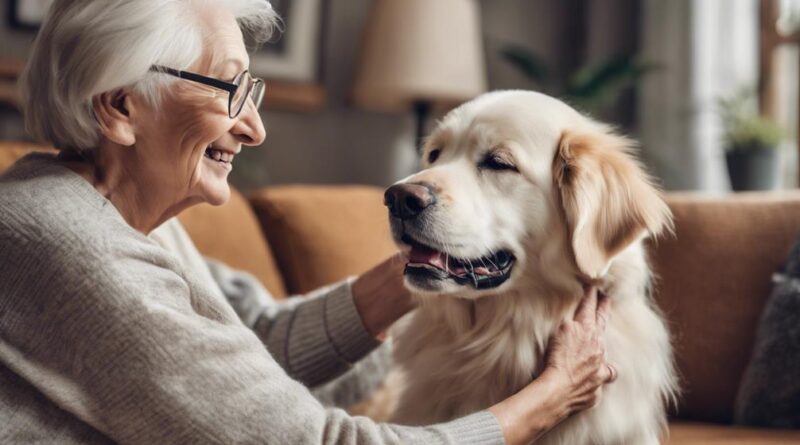13 Exceptional Therapy Dogs for Senior Companionship
Looking for exceptional therapy dogs for senior companionship? Check out the gentle Golden Retriever, known for loyalty and calming company. Labrador Retrievers offer deep connections and emotional support. Poodles are intelligent and hypoallergenic, while Cavalier King Charles Spaniels provide unwavering companionship. French Bulldogs are affectionate and low maintenance. Beagles bring empathy and playful joy. Pembroke Welsh Corgis blend charm and vitality for seniors. These breeds not only offer friendship but can also help reduce anxiety and loneliness – a true gift for seniors. Explore the benefits of these therapy dogs for a fulfilling companionship experience.
Golden Retriever
If you're considering a Golden Retriever as a therapy dog for senior companionship, their gentle nature and loyalty make them an excellent choice. Therapy dog training for Golden Retrievers is essential to ensure they can provide the necessary support and comfort to seniors. These dogs are known for their friendly and tolerant attitudes, which are crucial traits for interacting with elderly individuals. Their calm demeanor and eagerness to please make them well-suited for therapy work, bringing joy and companionship to seniors in need.
When it comes to health benefits, having a Golden Retriever as a therapy dog can have numerous positive impacts on seniors. The presence of these dogs can help reduce feelings of loneliness and anxiety, promoting emotional well-being. Interacting with therapy dogs has been shown to lower blood pressure and reduce stress levels, which can be particularly beneficial for elderly individuals. Moreover, the physical activity involved in caring for a dog can help seniors stay active and improve their overall health.
Labrador Retriever
Consider the Labrador Retriever for senior companionship as their friendly demeanor and adaptable nature make them well-suited for providing comfort and support to elderly individuals. Labradors in therapy have shown remarkable abilities to connect with seniors on a deep emotional level, offering companionship that can brighten their days and reduce feelings of loneliness.
Labradors are known for their gentle and affectionate disposition, making them ideal retriever companionship for seniors seeking a loyal and loving companion. Whether it's a quiet moment of sitting together or a playful interaction, these dogs have a way of bringing joy and comfort to those in their presence. Their intuitive nature allows them to sense when their human needs a nudge of encouragement or a comforting snuggle, making them invaluable partners for senior citizens.
In therapy settings, Labradors excel at providing emotional support and a sense of security to seniors experiencing various challenges. Their nonjudgmental attitude and unwavering loyalty create a safe space for older individuals to express themselves and form a special bond with their furry friend. The presence of a Labrador Retriever can have a calming effect, easing anxiety and promoting overall well-being in seniors who may be dealing with health issues or adjusting to life in a care facility.
Choose a Labrador Retriever for senior companionship and experience the incredible difference these loving dogs can make in the lives of elderly individuals.
Poodle
Poodles are frequently chosen as therapy dogs for seniors due to their intelligence and hypoallergenic coat. These adaptable and affectionate companions come in three sizes: standard, miniature, and toy, making them suitable for various living situations. When it comes to grooming, Poodles require regular brushing to prevent matting and professional grooming every 4-6 weeks to maintain their iconic coats. Additionally, keeping their ears clean and dry can help prevent ear infections, a common health concern for this breed.
Training a Poodle involves positive reinforcement techniques such as treats and praise to encourage good behavior. Their high intelligence and eagerness to please make them quick learners, excelling in obedience training and agility exercises. Mental stimulation is crucial for Poodles, so engaging them in interactive games and puzzles can help keep their minds sharp and focused.
In terms of exercise, Poodles are energetic dogs that require daily walks and playtime to stay healthy and happy. Activities like fetch, swimming, and short runs can help meet their exercise needs and prevent boredom. Monitoring their weight is essential to prevent joint issues, another common health concern for Poodles. By providing them with a balanced diet and regular exercise, you can ensure your Poodle stays fit and active for their role as a comforting therapy dog for seniors.
Cavalier King Charles Spaniel
The Cavalier King Charles Spaniel, known for its gentle nature and affectionate demeanor, is a popular choice as a therapy dog for seniors. These Spaniels are characterized by their friendly and sociable personality, making them wonderful companions for older adults seeking comfort and emotional support. Their playful yet calm temperament often brings joy to seniors and helps reduce feelings of loneliness or anxiety.
When it comes to grooming your Cavalier King Charles Spaniel, regular brushing is essential to keep their silky coat free of tangles and mats. Aim to brush them at least a few times a week to prevent any knots from forming. Additionally, due to their floppy ears, it's crucial to check and clean them regularly to avoid infections. Gentle cleaning with a damp cloth should suffice, but be sure not to insert anything into the ear canal.
Maintaining good hygiene practices, such as dental care and nail trimming, is also vital for your Spaniel's overall well-being. Brush their teeth a few times a week and trim their nails when needed to prevent overgrowth or discomfort. By staying on top of grooming tasks and hygiene routines, you can ensure that your Cavalier King Charles Spaniel remains healthy and happy, ready to provide unwavering companionship to the seniors they serve.
French Bulldog
Moving on from the Cavalier King Charles Spaniel, another wonderful therapy dog for seniors is the French Bulldog, known for its affectionate nature and loyal companionship. French Bulldogs have a charming temperament that makes them great companions for seniors. Here are some essential points to consider when caring for a French Bulldog:
- Playful and Affectionate: French Bulldogs are known for their playful and affectionate nature, making them excellent companions for seniors seeking emotional support and love.
- Low Maintenance Grooming: When it comes to grooming, French Bulldogs are relatively low maintenance compared to other breeds. Regular brushing and occasional baths are usually sufficient to keep their coat clean and healthy.
- Exercise Needs: Despite their small size, French Bulldogs require regular exercise to stay healthy. Daily short walks and interactive playtime indoors can help keep them physically and mentally stimulated.
- Heat Sensitivity: Due to their flat faces, French Bulldogs can have difficulty regulating their body temperature, making them sensitive to hot weather. It's crucial to ensure they have access to shade and water during warm days.
Understanding the French Bulldog's temperament and following proper grooming practices are key to providing optimal care for these loving therapy dogs, ensuring a fulfilling companionship for seniors.
Beagle
With their friendly demeanor and energetic spirit, Beagles are renowned for their adaptability and loyalty as therapy dogs for seniors. Beagle therapy benefits include their innate ability to provide emotional support and companionship to seniors, easing feelings of loneliness and anxiety. These compact and loving dogs have a keen sense of empathy, making them excellent at comforting and uplifting their senior companions.
Beagles are well-suited for senior care benefits due to their manageable size and gentle nature. Their playful disposition can bring a sense of joy and light-heartedness to seniors, encouraging physical activity and mental stimulation. Beagles are known for forming strong bonds with their owners, offering unwavering loyalty and companionship to seniors in need of a reliable and affectionate friend.
As therapy dogs, Beagles excel in providing a sense of routine and purpose to seniors, helping them establish a daily schedule and providing motivation for activities such as short walks or playtime. The presence of a Beagle can also encourage social interaction, whether it's with the dog itself or with others in the community, fostering a sense of connection and belonging for seniors. Consider the Beagle's amiable nature and unwavering devotion when seeking a therapy dog for senior companionship.
Shih Tzu
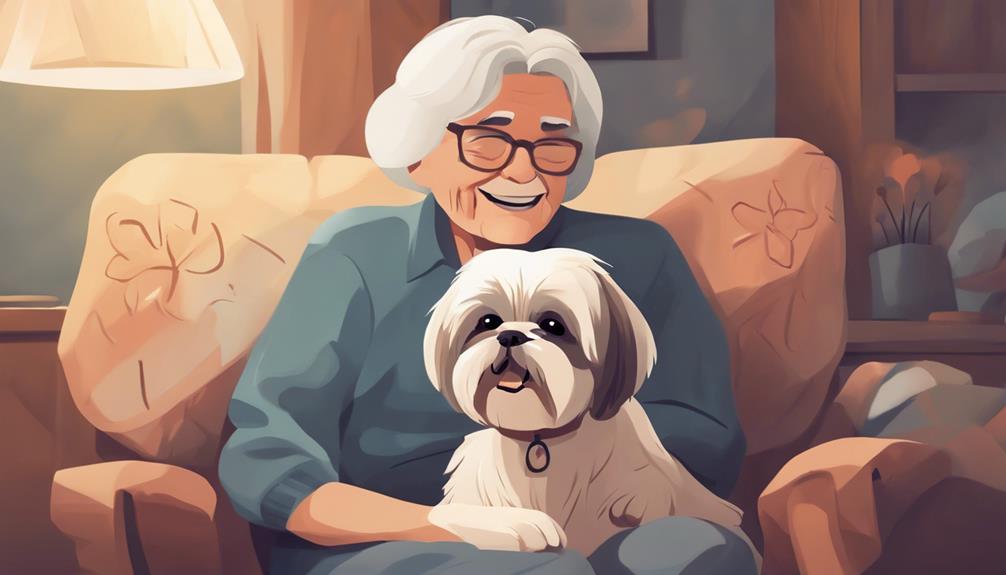
Consider how a Shih Tzu's gentle nature and affectionate demeanor can bring comfort and companionship to seniors in need of emotional support and connection. Shih Tzus are known for their loving personalities and make excellent therapy dogs due to their small size, adaptability, and friendly disposition. Here are some key points to keep in mind when considering a Shih Tzu as a companion for seniors:
- Grooming Tips: Shih Tzus have a luxurious double coat that requires regular grooming to prevent matting and tangles. Daily brushing and monthly baths are essential to keep their coat healthy and shiny.
- Bonding Activities: Engaging in activities such as gentle walks, interactive play sessions, and cuddle time can strengthen the bond between a senior and their Shih Tzu. These activities also provide mental stimulation for both the dog and the senior.
- Health Concerns: Shih Tzus are prone to certain health issues like eye problems, dental disease, and respiratory problems due to their flat faces. Regular veterinary check-ups and a nutritious diet are crucial for maintaining their overall health.
- Training Techniques: Positive reinforcement methods work best when training a Shih Tzu. Patience, consistency, and rewards such as treats or praise can help in teaching them obedience and good manners.
Dachshund
A Dachshund's friendly demeanor and loyal nature make them excellent companions for seniors seeking a loving and devoted canine friend. Dachshunds, with their distinct long bodies and short legs, aren't only adorable but also known for their playful and affectionate personalities that can bring joy and comfort to seniors. When considering a Dachshund as a therapy dog for a senior loved one, it's essential to understand some key aspects of their care.
Dachshund training tips are crucial to ensure a well-behaved and happy companion. Due to their independent nature, early socialization and consistent training are vital. Positive reinforcement techniques work best with Dachshunds, as they respond well to praise and rewards. Their intelligence and stubborn streak can sometimes pose challenges, so patience and persistence during training sessions are key.
In terms of Dachshund health concerns, their unique body shape makes them prone to back problems, particularly intervertebral disc disease. Seniors should be cautious about activities that could strain their Dachshund's back, such as jumping on and off furniture or climbing stairs. Regular veterinary check-ups, a balanced diet, and maintaining a healthy weight are essential preventive measures to ensure the Dachshund's well-being and longevity as a loyal companion to a senior individual.
Boxer
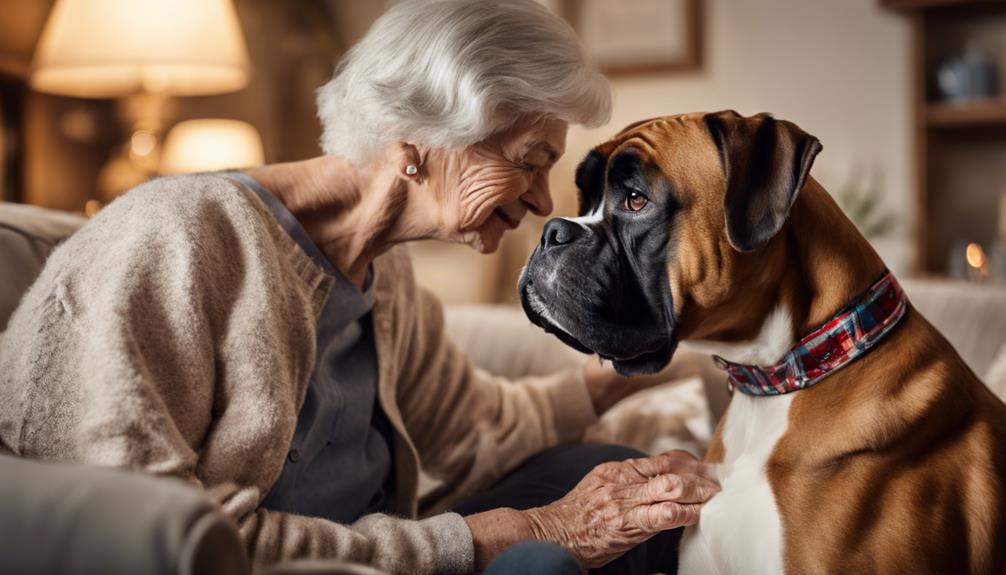
When choosing a Boxer as a therapy dog for a senior companion, it's essential to understand their energetic and affectionate nature. Boxers are known for their playful and loyal demeanor, making them great companions for seniors in need of love and interaction.
Here's what you should know when considering a Boxer as a therapy dog for a senior:
- Boxer Temperament: Boxers are friendly, outgoing, and good-natured dogs. They're patient and gentle, which is ideal for providing comfort to seniors who may need a calming presence.
- Boxer Exercise Needs: Boxers are high-energy dogs that require regular exercise to stay happy and healthy. Daily walks and playtime are essential to keep them physically and mentally stimulated, making them a perfect motivator for seniors to stay active.
- Affectionate Companions: Boxers thrive on human companionship and are known for forming strong bonds with their owners. Their loving nature can bring immense joy and emotional support to seniors who may feel lonely or isolated.
- Training and Socialization: Proper training and socialization are crucial for Boxers to become well-behaved therapy dogs. With the right guidance, Boxers can excel in providing emotional support and companionship to seniors in need.
Miniature Schnauzer
The Miniature Schnauzer's friendly and adaptable nature makes it an excellent choice for providing companionship and emotional support to seniors. These small-sized dogs are known for their affectionate demeanor and intelligence, making them ideal therapy companions for the elderly.
When it comes to grooming your Miniature Schnauzer, it's essential to maintain their distinctive double coat. Regular brushing will help prevent matting and keep their coat looking neat. Additionally, trimming their coat every 4-6 weeks can help maintain their signature Schnauzer look.
In terms of training, Miniature Schnauzers are highly intelligent and respond well to positive reinforcement techniques. Consistency is key when training these dogs, as they thrive on routine and clear expectations. Utilizing rewards such as treats and praise can be effective in reinforcing good behavior. Socialization is also crucial for Miniature Schnauzers to ensure they're comfortable around other people and pets.
Yorkshire Terrier
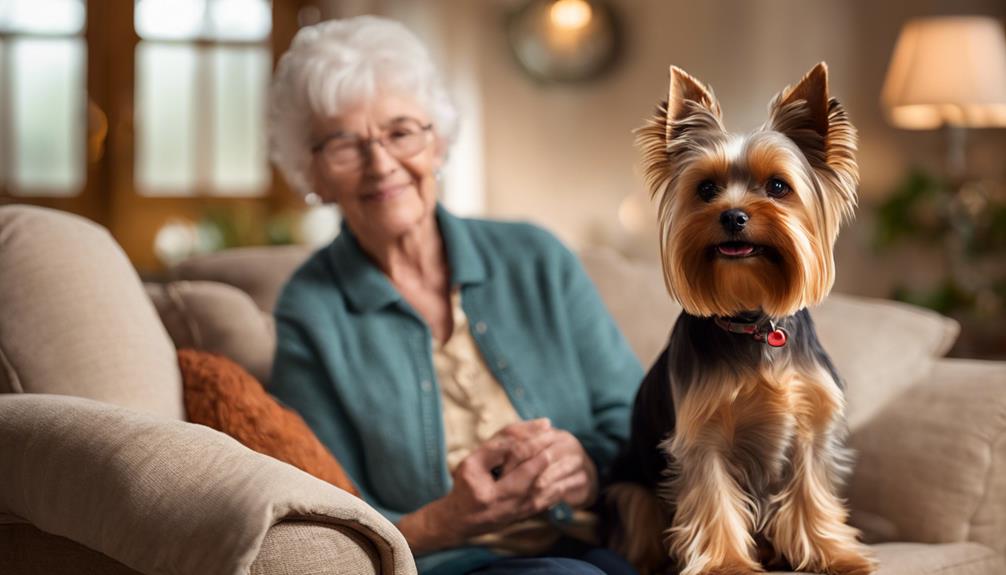
With their small size and lively personality, Yorkshire Terriers make wonderful companions for seniors seeking affectionate and energetic canine friends. If you're considering a Yorkshire Terrier as a therapy dog for a senior loved one, here are some key points to keep in mind:
- Yorkshire Terrier Temperament: These dogs are known for their feisty and affectionate nature. They bond closely with their owners and thrive on attention and love. Their playful demeanor can bring joy and entertainment to seniors looking for a lively companion.
- Training: Despite their small size, Yorkshire Terriers are intelligent and eager to please. Consistent training from an early age can help them become well-behaved therapy dogs. Positive reinforcement techniques work best with this breed.
- Grooming: The Yorkshire Terrier's long, silky coat requires regular grooming to prevent matting and tangling. Seniors should be prepared for frequent brushing and occasional trips to a professional groomer to keep their Yorkie looking and feeling their best.
- Health: Like all breeds, Yorkshire Terriers are susceptible to certain health issues such as dental problems and patellar luxation. Regular veterinary check-ups and a balanced diet can help ensure a happy and healthy life for your senior companion and their furry friend.
Bernese Mountain Dog
For those seeking a loyal and gentle companion that thrives in providing comfort, the Bernese Mountain Dog stands out as an ideal choice for seniors looking for a devoted four-legged friend. The Bernese Mountain Dog temperament is known for being affectionate, calm, and patient, making them wonderful therapy dogs for providing emotional support and companionship to seniors. Their gentle nature and willingness to please make them well-suited for comforting those in need of a furry friend.
In terms of grooming requirements, the Bernese Mountain Dog has a thick coat that requires regular maintenance to keep it in top condition. Weekly brushing is essential to prevent matting and reduce shedding, especially during seasonal changes. This grooming routine not only helps to keep their coat healthy but also provides a bonding opportunity between the senior and their canine companion. Additionally, occasional baths, nail trims, and ear cleanings are necessary to ensure the Bernese Mountain Dog remains clean and comfortable.
Pembroke Welsh Corgi
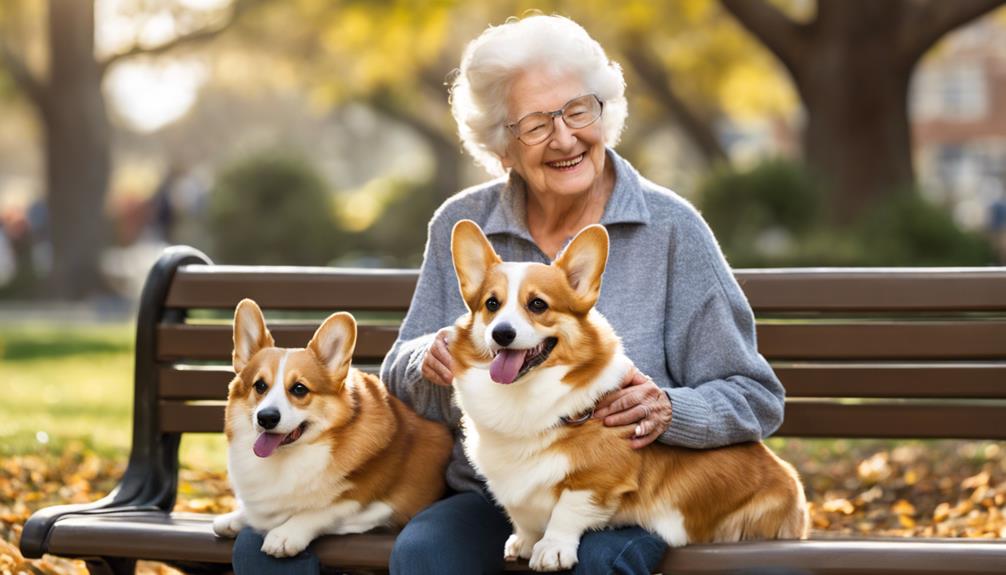
Consider the Pembroke Welsh Corgi as a charming and affectionate choice for seniors seeking a lively and loyal companion that can provide both emotional support and companionship. These adorable dogs offer more than just companionship; they can truly make a difference in the lives of seniors. Here are some reasons why the Pembroke Welsh Corgi is an excellent therapy dog choice:
- Affectionate Nature: Corgis are known for their loving and affectionate personalities, making them excellent at providing emotional support to seniors.
- Lively Demeanor: Their playful and energetic nature can help seniors stay active and engaged, improving their overall well-being.
- Adaptability: Pembroke Welsh Corgis are adaptable to various living situations, making them ideal for seniors living in different environments.
- Intelligent Companions: These intelligent dogs are quick learners, making them easy to train for specific therapy tasks tailored to the senior's needs.
When seeking a therapy dog for emotional support and companionship, the Pembroke Welsh Corgi stands out for its unique blend of charm, loyalty, and vitality. Their presence can bring joy and comfort to seniors, fostering a sense of purpose and connection. Corgis not only offer companionship but also provide a source of love and support that can greatly benefit seniors in their daily lives.
Frequently Asked Questions
Can Therapy Dogs Be Trained to Assist With Specific Medical Conditions?
Yes, therapy dogs can be trained to assist with specific medical conditions. Training techniques focus on teaching dogs to perform tasks that aid individuals with various health concerns. From fetching medication to providing physical support, these dogs offer valuable medical assistance.
Additionally, their behavioral support and presence have shown to have significant health benefits, such as reducing stress and improving overall well-being. Their training can be tailored to meet specific medical needs effectively.
Do Therapy Dogs Require Any Special Grooming or Maintenance?
To keep therapy dogs healthy and happy, regular brushing and professional grooming are essential.
It's important to provide dietary supplements and establish a consistent exercise routine for their well-being.
How Can Senior Citizens Benefit From the Companionship of Therapy Dogs?
Having a therapy dog as a senior citizen can bring you emotional support and increase social interaction. It can also provide mental stimulation and encourage physical activity.
Their companionship can help combat loneliness and boost your overall well-being. Engaging with a therapy dog can create a sense of purpose and routine in your daily life, making each day more fulfilling and enjoyable.
Consider how a therapy dog could positively impact your life as a senior citizen.
Are There Specific Requirements for Senior Citizens to Have a Therapy Dog?
To have a therapy dog, senior citizens must meet specific requirements. Some key points include completing training programs and meeting certification requirements. These programs ensure that the dog is well-trained to provide emotional support and engage in bonding activities with the senior.
Can Therapy Dogs Be Helpful for Seniors With Dementia or Alzheimer's?
Therapy dogs can be incredibly helpful for seniors living with dementia or Alzheimer's. These furry companions provide emotional support, promote memory improvement, offer cognitive stimulation, and encourage social interaction.
Through their presence, therapy dogs can reduce feelings of loneliness, anxiety, and agitation commonly experienced by seniors with these conditions. The unconditional love and companionship they provide can greatly enhance the quality of life for seniors facing the challenges of dementia or Alzheimer's.
Conclusion
In conclusion, therapy dogs can provide invaluable companionship and support for seniors. Whether it's a gentle Golden Retriever, a loyal Labrador Retriever, or a playful Poodle, these furry friends can bring comfort and joy to those in need.
Consider adopting one of these exceptional therapy dogs to help brighten the days of seniors and enhance their overall well-being. Their unconditional love and companionship can truly make a difference in the lives of older adults.
